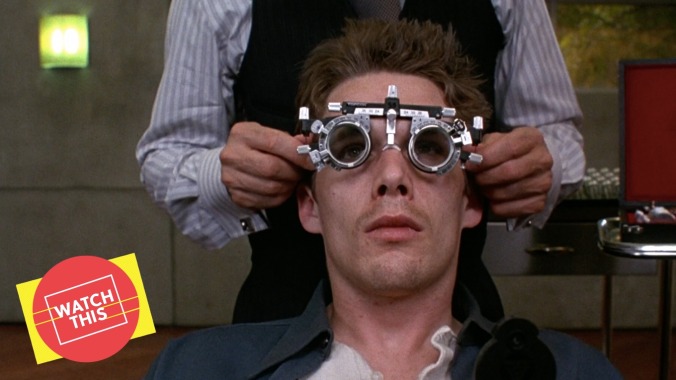Ethan Hawke and Jude Law brought human frailty to the polished sci-fi of Gattaca
Writer-director Andrew Niccol mixes sci-fi empathy with the stylish trappings of film noir

Watch This offers movie recommendations inspired by new releases, premieres, current events, or occasionally just our inscrutable whims. This week: With the Hugh Jackman vehicle Reminiscence headed for theaters and streaming, we’re thinking back on other sci-fi noirs.
Gattaca (1997)
Gattaca is such a reserved, orderly little science fiction drama that it’s easy to miss just how many elements of film noir it contains. It’s a neat example of form following function: Just as its lead character hides behind a respectable false identity, the movie conceals its noir elements under a sterile near-future surface. Nothing looks amiss with Vincent (Ethan Hawke), a handsome and literally well-scrubbed employee of Gattaca, a private aerospace firm. He presents himself as a physically fit striver who, like his co-workers, has been genetically engineered for success, wiped of any predispositions toward health issues.
It’s not illegal, in this dsytopia, for parents to take their chances on natural-born children. But it’s not exactly advisable, either, given how many ambitious plans, like Vincent’s dreams of space travel, require a robust genetic profile. The catch here is that this seemingly fine specimen has been engaging in a long-term deception: It turns out that Vincent was conceived naturally, and has a heart condition that makes him an “in-valid,” in the brave new world’s unforgiving parlance. Everyone at Gattaca knows him as Jerome—a name and “valid” identity he’s purchased from the real Jerome (Jude Law), a former swimming champion who lost the use of his legs in an unregistered accident.
Jerome also provides various biological samples to assist with the ruse, staying out of sight as Vincent’s well-paid shadow. The movie opens with Vincent meticulously planting tiny pieces of genetic evidence around his workstation while attempting to erase any trace of his own skin or hair. When a murder occurs at Gattaca’s offices, the accompanying scrutiny threatens to blow the entire operation, just as Vincent is preparing for his dream mission and connecting with reserved fellow employee Irene (Uma Thurman).








































